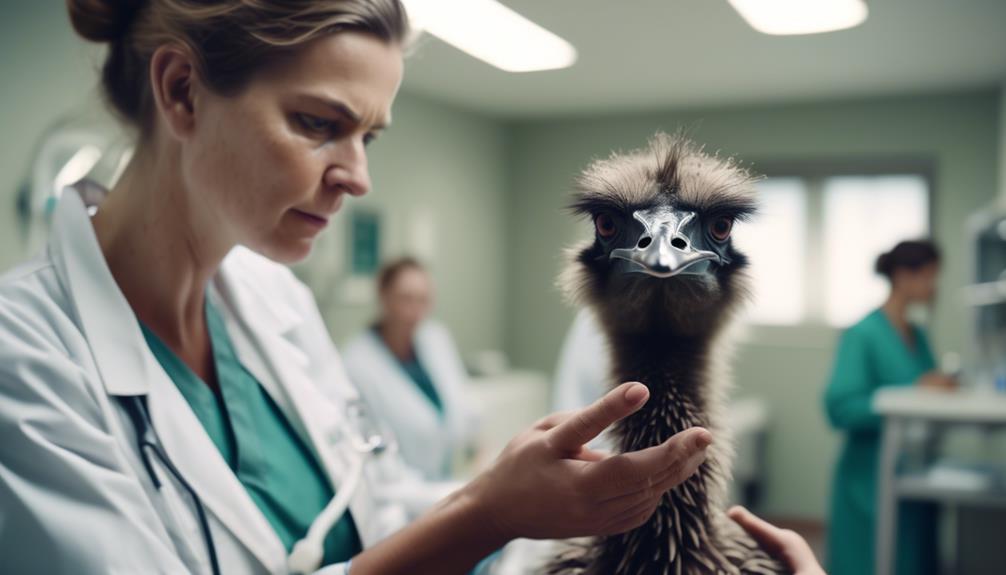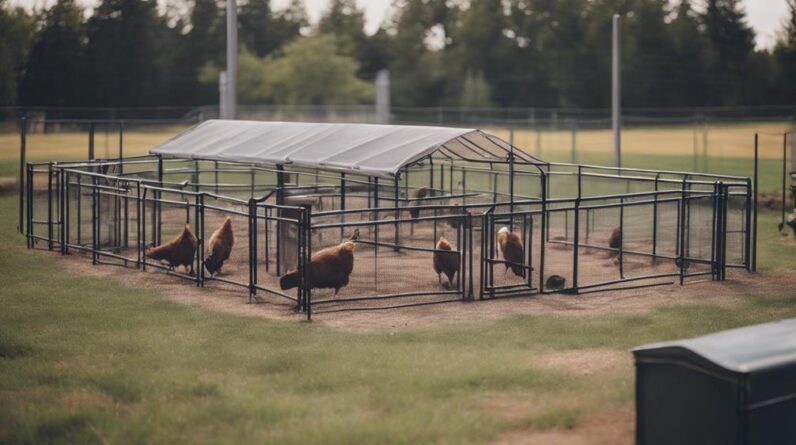
As you stand at the edge of the vast emu enclosure, the vibrant plumage of these majestic birds catches your eye. But beneath their striking appearance lies a hidden danger – the threat of common diseases that can wreak havoc on their health.
In this discussion, we will explore the importance of understanding and preventing these ailments in emus, from identifying symptoms to implementing effective disease management strategies.
So, join us as we uncover the secrets to safeguarding the well-being of these magnificent creatures, and discover how you can play a vital role in their protection.
Types of Emu Diseases

Emus can be affected by a variety of diseases that can impact their health and well-being. Understanding the types of diseases that can affect emus is essential for their proper care and management.
One important aspect to consider is emu disease transmission. Diseases can be transmitted through direct contact with infected emus, contaminated surfaces, or vectors such as insects. It's crucial to implement proper biosecurity measures to prevent the spread of diseases among the emus.
When it comes to treatment options for emu diseases, it's essential to consult a veterinarian who specializes in avian health. They can conduct thorough examinations and diagnostic tests to identify the specific disease and recommend appropriate treatment. Treatment options may include administering medications, such as antibiotics or antiviral drugs, to combat bacterial or viral infections. In some cases, surgical intervention may be necessary to remove tumors or abscesses. Additionally, supportive care, such as providing a balanced diet, clean water, and a suitable environment, is essential to help emus recover from illnesses.
Proactively monitoring the health of emus and implementing preventative measures can significantly reduce the risk of diseases. Regular vaccinations, proper nutrition, and maintaining a clean and hygienic environment are crucial to keeping emus healthy and disease-free.
Common Symptoms to Look Out For
Be vigilant for signs of illness in emus by observing common symptoms that may indicate the presence of disease. Early detection is crucial in providing proper care and improving the chances of recovery for these majestic birds. By familiarizing yourself with these symptoms, you can take swift action and prevent the spread of diseases among your emus.
One common symptom to look out for is a loss of appetite. If your emu isn't consuming its usual amount of food or appears uninterested in eating, it could be a sign of an underlying health issue.
Additionally, emus may exhibit abnormal behaviors such as lethargy, weakness, or a lack of energy. These changes in behavior may indicate the presence of an illness that requires attention.
Another symptom to watch for is respiratory distress. Emus may display difficulty breathing, coughing, or sneezing, which can be indicative of respiratory infections or other respiratory diseases.
Additionally, keep an eye out for any changes in the appearance of their feathers or skin, such as ruffled feathers, bald patches, or lesions. These physical changes may signify the presence of parasites or skin infections.
Preventive Measures for Emu Health

To ensure the overall well-being of your emus, implementing preventive measures is essential in maintaining their health and minimizing the risk of common diseases. Here are three key preventive measures you can take to ensure the health of your emus:
- Emu nutrition: Providing a balanced and nutritious diet is crucial for the health of your emus. Emus are omnivores and require a diet that consists of both plant matter and protein sources. Their diet should include a variety of fruits, vegetables, grains, and insects. It's important to monitor their food intake and ensure they have access to fresh water at all times. Additionally, emus should be fed a diet that's appropriate for their age and reproductive status to meet their specific nutritional needs.
- Emu breeding techniques: If you're involved in emu breeding, it's important to follow proper breeding techniques to maintain the health of your emus. This includes selecting healthy breeding pairs, ensuring proper spacing and living conditions for breeding emus, and monitoring the breeding process closely. Regular veterinary check-ups and consultations with experienced emu breeders can help ensure successful breeding and minimize the risk of potential health issues in the offspring.
- Regular veterinary care: Regular veterinary check-ups are essential for maintaining the health of your emus. A qualified veterinarian specializing in emus can provide comprehensive health assessments, perform necessary vaccinations, and offer guidance on preventive measures specific to your emus' needs. Regular check-ups can help identify and address any potential health issues early on, preventing them from developing into more serious conditions.
Importance of Vaccinations
Vaccinations play a crucial role in safeguarding the health and well-being of your emus by providing essential protection against common diseases. When it comes to preventing diseases, vaccines are highly effective tools. They work by stimulating the immune system to produce a response against specific pathogens, such as bacteria or viruses, thereby preparing the body to fight off future infections.
The efficacy of vaccines can vary depending on factors such as the type of disease, the vaccine formulation, and the individual emu's immune response. However, overall, vaccines have been proven to significantly reduce the risk of disease and the severity of symptoms in emus.
To ensure optimal protection, it's important to follow immunization schedules recommended by veterinarians. These schedules outline the appropriate timing and dosing of vaccines for emus at different stages of life. Starting vaccinations early in life helps provide the best defense against diseases that may pose a threat to young emus. Additionally, annual booster shots are typically recommended to maintain immunity and reinforce protection.
Tips for Effective Disease Management

To effectively manage diseases in emus, it's crucial to implement proactive measures for prevention and early detection. By following these tips, you can ensure the health and well-being of your emus:
- Biosecurity measures: Establishing strict biosecurity protocols is essential to prevent the introduction and spread of diseases in your emu flock. This includes controlling access to your facility, disinfecting equipment and vehicles, and limiting contact with other animals.
- Quarantine protocols: Implementing quarantine measures is vital when introducing new emus or birds into your flock. Isolating new arrivals for a period of time allows you to monitor their health and detect any potential diseases before they spread to the rest of the flock.
- Regular health monitoring: Keep a close eye on your emus' health by conducting regular physical examinations, observing their behavior, and monitoring their appetite and droppings. Early detection of any abnormalities or signs of illness can significantly improve treatment outcomes.
Frequently Asked Questions
Can Emus Transmit Diseases to Humans?
Emus can transmit diseases to humans, posing potential zoonotic infections. Understanding and preventing common diseases in emus is crucial for safeguarding human health. Take precautions and seek medical attention if necessary. Stay informed to protect yourself and those around you.
Are There Any Natural Remedies or Alternative Treatments for Emu Diseases?
There are no natural remedies or alternative treatments specifically for emu diseases. However, herbal remedies and holistic treatments may help promote overall health and boost the immune system of emus.
How Often Should Emus Be Vaccinated?
To ensure the health of your emus, it is crucial to understand the importance of vaccination. Properly vaccinating your emus on a regular basis is essential for preventing common diseases and maintaining their well-being.
Are There Any Specific Dietary Requirements to Prevent Emu Diseases?
To prevent emu diseases, it's crucial to meet their specific dietary requirements. Proper nutrition plays a vital role in keeping emus healthy and preventing potential issues. Neglecting their diet can have negative consequences on the emu farming industry.
Can Emus Be Carriers of Diseases Without Showing Any Symptoms?
Emus can indeed be asymptomatic carriers of diseases, meaning they can transmit illnesses without showing any symptoms themselves. This poses transmission risks and highlights the importance of regular health monitoring and preventive measures.
Conclusion
In conclusion, understanding and preventing common diseases in emus is crucial for their health and well-being.
One interesting statistic to consider is that nearly 80% of emus can be affected by a specific respiratory disease, causing them to exhibit coughing and difficulty breathing.
By implementing preventive measures such as regular vaccination and proper disease management, emus can lead healthier lives and minimize the risk of contracting these common diseases.





